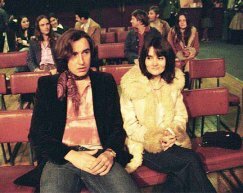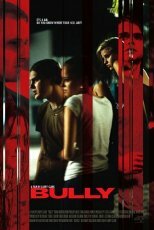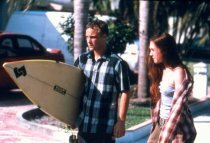|
|
Monday, 15 April, 2002 @ 9.58pm GMT
Posted by Bodie
|

24 Hour Party People
Dir: Michael Winterbottom
Cert: 18
Running time: 110mins
Michael Winterbottom seems to be about the most prolific director working today. Not only is he able to knock off at least a film a year, the consistency of his quality control continues to both surprise and impress. Previously, he's tackled subjects as diverse as Thomas Hardy adaptations (The Claim, Jude), serial killer road movies (Butterfly Kiss), the Balkans conflict (Welcome To Sarajevo) among others. Now, with 24 Hour Party People, he takes on a kind of musical biography, a sort of love letter to the city of Manchester as seen through the eyes of one man, local TV presenter and part-time pop entrepreneur Tony (Anthony H) Wilson.
The movie covers almost twenty years in Wilson's life, from the mid-seventies and the punk explosion, to the implosion of the Factory Records empire that Wilson somehow manages to create. We follow, through Wilson's eyes, the stories of three of the most influential bands to come from Manchester, Joy Division, New Order, and Happy Mondays. Weaved through this we follow Wilson as he balances his day job of local TV (silly animal stories, mis-firing political interviews) with the night job of trying to create, then control, a record label, a nightclub, an entire musical scene, while drugs, dealers, and both astonishing creative impulses, and lunatic business decisions come together to undermine Wilson's world.
Wilson is played by Steve Coogan who brings in the geeky pretentiousness act from his Alan Partridge days, and grafts on a splendid Wilson impersonation. Wilson is, as almost everyone in the movie reminds him at some stage or other, a cunt. Inept, embarrassing, not-quite-intellectual, never, ever cool. Poor at relationships, useless at business, iffy dress sense. This is perfect Coogan material, and he jumps into the character with relish.
Coogan's supported by an excellent cast. At times it feels like a roll-call of current UK comic acting talent, and it may be a little distracting to some to have Brit TV performers (John Thomson, Peter Kay) recycle characters they've been using for years. Some of the musical talent comes off better, and special nods should go out to Sean Harris's Ian Curtis, and Danny Cunningham's Shaun Ryder. Also excellent are Andy Serkis as monster record producer Martin Hannett, and Paddy Considine as Wilson's partner Rob Gretton.
 Too often, musical performances in movies, like sports, come across as badly-staged, and too-self consciously acted, but everything here feels natural and, well, real. The documentary aspect is played up by director Winterbottom in a number of ways. It's shot handheld throughout, on digital video rather than on film, by Alex Cox and Wim Wenders' cohort Robby Muller, which gives it a grainy immediacy. The movie plays tricks with time constantly, with Wilson/Coogan not just narrating the film, but speaking direct to camera, pointing out things that aren't real, or that never happened, but were included because they reinforce the vibe rather than the reality of 1970s/1980s Manchester. It's a film that you can watch like a book, in an odd sort of way, several stories and viewpoints consistently overlapping.
It's a funny movie, with some great music, and one superb Morrissey gag. It doesn't really matter if you've never heard of Wilson or Factory or any of the bands he brings to success (or in the cases of Vini Reilly or A Certain Ratio, perhaps deserved obscurity). The movie works on its own, and doesn't lean on the music for support. Though like Wilson says in the film, he's ultimately a supporting character in his own life story, dominated by the three geniuses he fosters; Ian Curtis, Martin Hannett and Shaun Ryder. And Wilson's still on telly in Manchester, if you ever tune in out there.
View the 24 Hour Party People trailer
|
Monday, 15 April, 2002 @ 6.18pm GMT
Posted by Bodie
|

Bully
Dir: Larry Clark
Cert: 18
Running time: 113mins
Larry Clark comes to this project with something of a tattered reputation. Depending on your point of view, he's either a fearless documenter of the reality of American youth, or he's a dirty old man, exploiting his subjects to get his middle-aged rocks off. With Bully, the jury's still out, but there's a feeling that a verdict might come soon.
Clark's photography (collected in books like Tulsa) has turned to an interest in film. 1995's Kids, looked at teen sex, 1998's Another Day In Paradise was a more straightforward crime on the run story, enlivened by an excellent turn by James Woods. Now, with Bully, he adapts Jim Schutze's trashy true crime book.
The film (and book) is based on a real case from the early 1990s. Florida teen Marty Puccio (Brad Renfro) is best buddies with Bobby Kent (Nick Stahl). Except where Marty is ineffectual, aimless, didn't graduate high school, Bobby is motivated, charismatic, intelligent and loved by his ambitious father (who hates the stupid Marty). Oh, and Bobby's a manipulative, violent sadist.
For the first hour we follow Bobby and Marty around, in a handheld documentary style. Bobby gets bullied, Marty gets violent. Everyone gets laid. Gradually, everyone in Marty's circle of friends sees the bad side of Bobby, because he bullies them like he does with Marty, or he rapes them.
Everyone gets together, and Marty's new (and pregnant) girlfriend Lisa (Rachel Miner) suggests what a good idea it would be if Bobby was dead. Talk builds on talk, and eventually a plan of sorts gets decided upon, even to the extent of hiring the next best thing to a hit man they can find, played by Leo Fitzpatrick (who was the lead in Kids).
The movie then details the various plottings, murder attempts, the eventual killing and its aftermath.
Question is: is the movie any good?
Erm, yes and no. Yes in that the movie's excellent at showing aimlessness, and how a single thought can build into a fatal incident. It's good at the documentary side of teenage life. Here you can almost hear director Clark shouting at us: Look! Kids have sex! Look! Kids take drugs! Look! Our chidren have no sense of responsibility! It also pokes some sly fun at the stupidity of the teens as they bumble from botched killing to half-arsed alibis.
 What it doesn't do is present us with any clear answers. We see that Bobby's a nasty piece of work. But rather than establish that in, say, twenty minutes (after all, if you pay to see a movie called Bully, once you've recognised who the bully is, surely it's time to move on), Clark dwells on this for over an hour, making it a focus, before getting on with any pretence of telling his story. He uses this first hour to indulge himself under the guise of giving the extended cast motivation to kill (which they don't need, because the entire point of the case is that the teens didn't have a logical bone between them). Clark lets his camera peer at both male and female flesh (though seeming to draw the line at male genitals, he shows no similar restraint with his female cast), which confuses his intent. Is he trying to make a serious point about youth, or is he getting his jollies?
The aftermath of the murder is dealt with almost embarrassing haste, ending in a bunch of TV-movie captions detailing the various sentences given. Clark's got little interest in this element, it seems. He likes the setting and the idea, but not the meat of the case, which again begs the question of why he lent his peculiar talent to this piece of work. There's a feeling that he's too interested in the control that Bobby Kent enjoys to give up this character early.
View the Bully trailer
|
|
|
LINK US
|


oioideej.com
|
|







